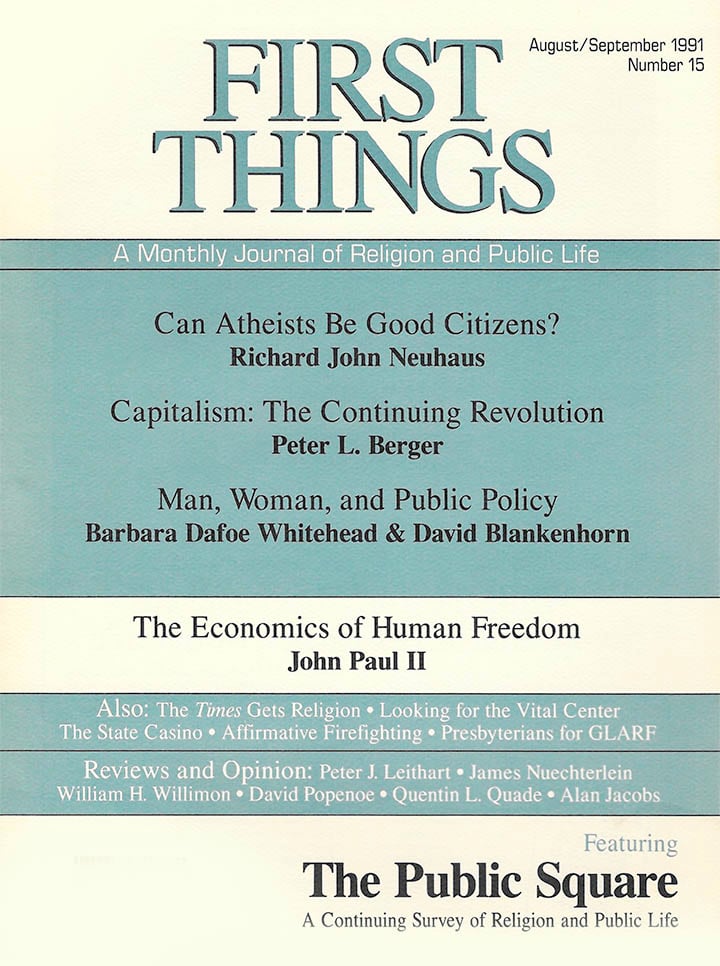The Conservative Constitution
by Russell Kirk
Regnery Gateway, 241 pages, $22.95
In the various worlds of American conservatism, that most resistant to modernity—the world, one might say, of the Tory Harrumph—has long been presided over by Russell Kirk. It has very little to do with American reality, but for those of a reactionary bent who imagine themselves superior to that reality, it apparently provides a congenial home. In The Conservative Constitution, the author offers a typical Kirkian tour of that mental habitat.
Kirk’s style is, as always, appropriate to the philosophy it sets forth: portentous, mannered, self-consciously archaic. Already on page 17 we find the inevitable reference to the “Permanent Things” (if Mr. Kirk has ever written anything without that phrase, I have not encountered it); throughout, we receive warnings against succumbing to “dogmata” (“dogmata,” as distinguished from Permanent Things, being ideas of which the author does not approve); finally, in heroic attempt at self-parody, Kirk twice excuses himself from elaborating an argument with the languid note that “time runs on, runs on.”
The ideas in The Conservative Constitution are no less familiar than the prose, though perhaps they strain credulity rather more than is customary. As the title indicates, Kirk’s topic is the American Constitution, which he improbably interprets as a document in the spirit of Edmund Burke. (Kirk’s original title for the book was Edmund Burke and the Constitution of the United States.) Presumably the Burke Mr. Kirk has in mind is not the one devoted wholeheartedly to institutions of the monarchy, an established church, and a hereditary aristocracy, or to ideas such as organicism, aversion to social and political equality, skepticism toward rapid social mobility, and reverence for antiquity.
To make his case, the author finds himself required largely to ignore James Madison—the Father of the Constitution—and virtually to read out of the American tradition Thomas Jefferson. Nor is one converted to Kirk’s argument by many of the names he invokes to document Burke’s centrality to constitutional development: the Federalists, John Randolph of Roanoke, and John C. Calhoun. It is no disparagement of any of them to note that, by and large, their ideas have not prevailed.
This is not to deny Kirk’s argument that the Constitution has served as a conservative bulwark in America—it has—or that Edmund Burke is a source of enduring wisdom who has much to teach Americans—he is and he does. But it is quite something else to suggest, as the author does, that Burke was more influential in the American founding than John Locke. Whether he should have been is another matter, but Mr. Kirk so aimlessly wanders from the one idea to the other that he appears not to notice the difference between them.
His favored form of disputation (beyond flat assertion) is demolition of straw men, as in “No, John Locke did not make the Glorious Revolution of 1688 or foreordain the Constitution of the United States.” That, to put the point gently, is unserious argument. There is much in Lockean liberalism open to philosophical challenge, but it requires remarkable ingenuity to minimize as radically as Kirk tries to do its influence on the founding generation (although even he, after much huffing and puffing to the contrary, finally has to concede its significance).
When he is not being implausibly contentious, Mr. Kirk has a number of sensible, if usually unremarkable, things to say about American constitutional development. He is a man of wide learning, and, precisely because he is so out of sympathy with so much that is commonplace in America, his observations, however eccentric, often bear attention.
The irony in Kirk’s position is that his own ideological “dogmata” blind him to the most promising prospect for a usable Burke in America. Burke is a traditionalist, but he recognizes that, within broad moral limits set by natural law, national traditions will legitimately vary according to the particularities of the nation’s history. Applied to America, that means what Kirk cannot bring himself to face: the major tradition to be preserved is classical liberalism.
More specifically, it means adherence to the American regime of bourgeois democratic capitalism. For Kirk—scornful of bourgeois culture, skeptical toward democracy, dubious about capitalist morality—this will not do. It all smacks suspiciously of neoconservatism, about which Kirk, here as elsewhere, has absolutely nothing good to say.
Judging from his extended and appreciative comments on Orestes Brownson—not the youthful radical but the mature conservative—Mr. Kirk’s preferred version of political economy appears to have its roots in premodern strains of Catholic social doctrine. People of that persuasion may fancy themselves as more in harmony with the Permanent Things than the rest of us—and indeed they may be—but in the world of American political thought, they are little more than curiosities.
James Nuechterlein is Editor of First Things .

